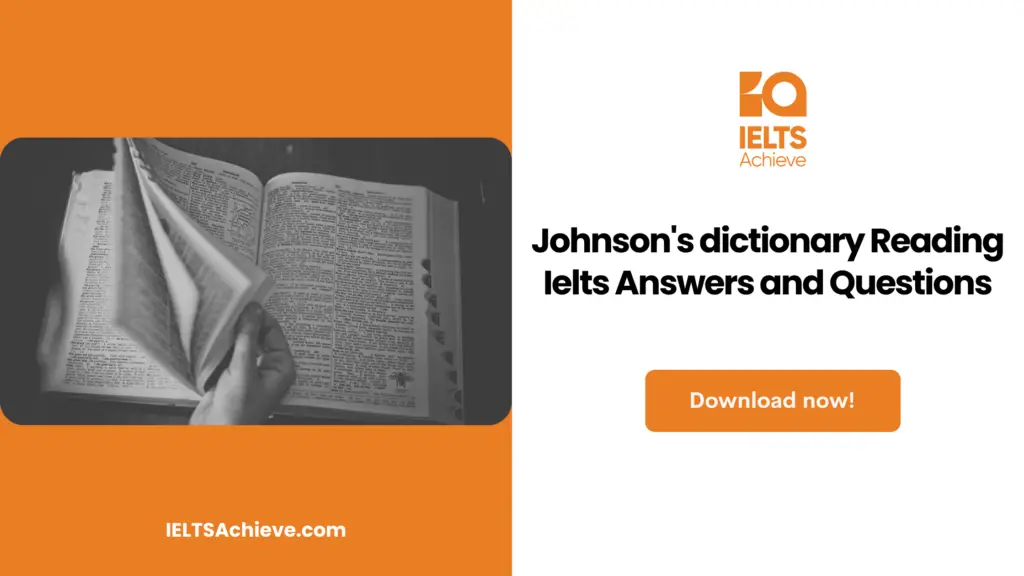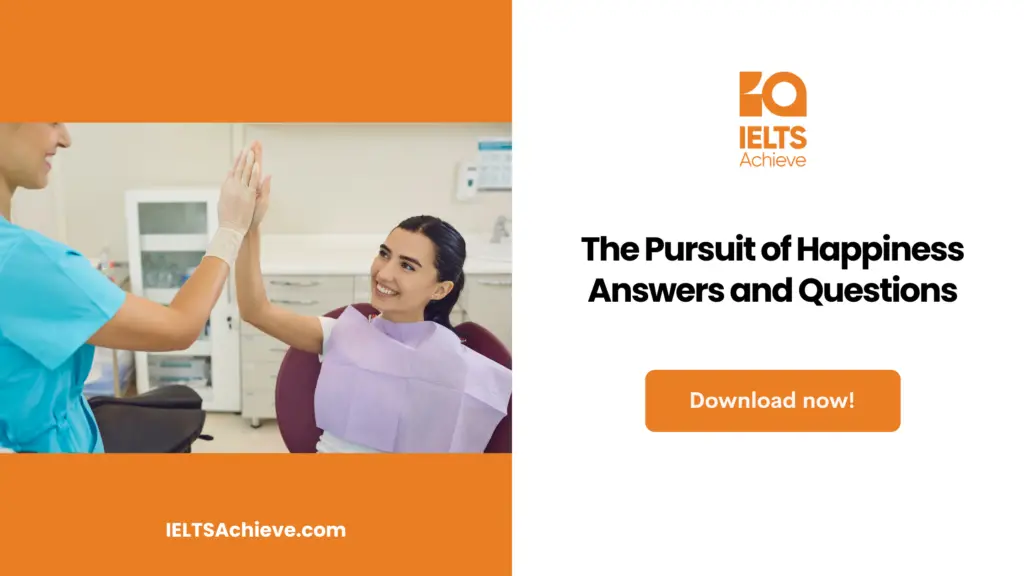The Blog post contains the following IELTS Reading Questions:
- IELTS Reading Summary Completion
- IELTS Reading True/false/not given
- IELTS Reading Matching Sentence Endings
Stay informed and prepared for success – Explore our comprehensive Reading Test Info page to get valuable insights, exam format details, and expert tips for mastering the IELTS Reading section.
IELTS Reading Passage: Johnson’s dictionary

Johnson’s dictionary
The “Johnson Dictionary” was published in 1775, the century before. There was consideration about the quality of the English language. There is no typical way to speak or write and there is no deal on the best way to bring some order to the confusion of English spelling. Dr. Johnson provided the solution. In the past, of course, there have been dictionaries, the first of which was a small book of about 120 pages, collected by a particular Robert Cawdray and published in 1604 under the title A Table Alphabet! Hard regular English words. Similar to the different dictionaries that came after it in the seventeenth century, Cowdrey also sought to focus on the words ‘scholar’, a function of which is to convey to its student a better sense of learning.
Beyond the practical need to create order out of confusion, the rise of dictionaries was associated with the rise of the English middle class, who defined different worlds and were eager to capture vocabulary and social and business. It is fitting that Dr. Samuel Johnson, a model of the eighteenth-century literary figure as famous as he was in our time, published his dictionary at the very start of the heyday of the middle class.
Johnson was a poet and critic who elevated public knowledge to the pinnacle of genius. His strategy to the problems that plagued writers in the late seventeenth and early eighteenth centuries was an intense practice. Until his time, without the establishment of an academy, the mission of creating such a large-scale dictionary seemed unthinkable, and he wrote that it did not require an academy to settle arguments about the Johnson language to make decisions about right and wrong use. A dictionary itself, he will do it with one hand. On June 18, 1764, Johnson signed a dictionary agreement with Robert Dosley, a bookseller, for breakfast at the Golden Anchor Hotel near Holbom Bar. He was to spend 1.575 in installments, from which he rented 17 Gough Square, in which he arranged his ‘dictionary workshop’.
James Boswell, his biographer, told the garret on which Johnson worked as ‘fitted like a counting house’, with a lengthy desk operating in the middle at which the copying clerks would work standing up. Johnson was in a bitter chair at an ‘old crazy deal table’, surrounded by a mess of borrowed books. He was assisted by six assistants, two of whom died while preparing the dictionary.
The task of filling about eighty large notebooks is enormous. Johnson wrote definitions of more than 40,000 words and explained their various meanings with 14.000 quotations taken from the English alphabet in each subject from Elizabeth to his time. He did not wish to reach full originality. Working within a time frame, he had to draw the best of all previous dictionaries and turn his work into a courageous collection. In fact, it was too much. Unlike his predecessors, Johnson treated English as a very practical, living language, with many various meanings. He accepted his definitions in the policy of English public law by example. After its publication, his dictionary did not compete vigorously for more than a century.
After many difficulties, the dictionary was ultimately published on 15 April 1775. It was immediately admitted as a symbol throughout Europe. This is a very classic task. The author of the leading Italian dictionary wrote, ‘It will be a lasting memorial to the author, especially a tribute to his own country, and a known advantage to the Republic of Letters throughout Europe.’ The fact that Johnson took the academies of Europe and fitted them in (it took forty years for forty French scholars to create the first French national dictionary) was the reason for the English celebration.
Johnson worked for nine years. ‘With little help from the learned, and without the support of the elders, not in the gentle gloom of retirement or in the shelter of the learned, but in the midst of trouble and distraction, in sickness and sorrow’. For all its flaws and peculiarities, his two-volume work is a masterpiece and a symbol, in his own words, ‘setting letters, showing analogy, arranging structures and identifying the identities of English words’. It is the cornerstone of standard English, an accomplishment that, in the words of James Boswell, ‘gave strength to the language of his country’. The dictionary, along with his other writings, made Johnson famous and his friends were able to win over George III to retire him. Since then, he has been a Johnson of folk tales.
Unlock your full potential in the IELTS Reading section – Visit our IELTS Reading Practice Question Answer page now!
Recommended Questions:
Renewable Energy IELTS Reading Question with Answer
Johnson’s dictionary reading answers questions
Question (1-3)
Complete the summary below.
Write NO MORE THAN THREE WORDS on your answer sheet from the passage for each answer.
Earlier dictionaries were small books of about 1 _________ pages. And it was published in 1604 under the title 2 ________________. Different dictionaries that came after it in the 3 ______________ century,
Boost your performance in Summary, Notes, Table, and Flowchart Completion tasks. Click here to explore our detailed guide and learn how to effectively complete summaries, notes, tables, and flowcharts in the IELTS Reading section.
Question (4 – 7)
Do the following statements agree with the information given in the reading passage?
Write any one of the below option on your answer sheet
TRUE – if the statement agrees with the information
FALSE – if the statement contradicts the information
NOT GIVEN – if there is no information on this in the passage
4. Johnson’s strategy to the problems that plagued writers in the late sixteenth and early eighteenth centuries.
5. The mission of creating such a large-scale dictionary seemed impossible, until Johnson’s time.
6. Johnson thought about completing his dictionary for many years.
7. Johnson was assisted by six assistants, two of whom died while preparing the dictionary.
Enhance your skills in identifying information as True, False, or Not Given. Click here to discover expert strategies and techniques for mastering this question type in the IELTS Reading section.
Question (8 – 13)
Complete each sentence with the correct ending, A–G, below.
Write the correct letter, A-G, as your answer on your answer sheet to each question.
8. Johnson was a poet and critic who elevated public knowledge
9. Johnson wrote that it did not require an academy to settle arguments about the Johnson language to
10. Johnson had to draw the best of all previous dictionaries and turn his work
11. Johnson treated English as a very practical, living language,
12. The fact that Johnson took the academies of Europe and fitted them in, was the
13. The dictionary, along with his other writings,
- made Johnson famous
- into a courageous collection
- arranging structures
- reason for the English celebration
- make decisions about right and wrong use
- with many various meanings
- to the pinnacle of genius
Ready to conquer Matching Headings questions? Click here to learn essential tips and techniques for matching headings accurately to paragraphs or sections in the IELTS Reading section.
Unlock your full potential in the IELTS Reading section – Visit our IELTS Reading Practice Question Answer page now!
Recommended Questions:
Renewable Energy IELTS Reading Question with Answer
Johnson’s dictionary reading answers
Solution for Q1. 120
Solution for Q2. A Table Alphabet
Solution for Q3. seventeenth
Solution for Q4. False
Solution for Q5. True
Solution for Q6 – Not given
Solution for Q7 – True Solution for Q8. G – to the pinnacle of genius
Solution for Q8. E – make decisions about right and wrong use
Solution for Q10. B – into a courageous collection
Solution for Q11. F – with many various meanings
Solution for Q12. D – reason for the English celebration
Solution for Q13. A – made Johnson famous

We hope you found this post useful in helping you to study for the IELTS Test. If you have any questions please let us know in the comments below or on the Facebook page.
The best way to keep up to date with posts like this is to like us on Facebook, then follow us on Instagram and Pinterest. If you need help preparing for the IELTS Test, join the IELTS Achieve Academy and see how we can assist you to achieve your desired band score. We offer an essay correction service, mock exams and online courses.

